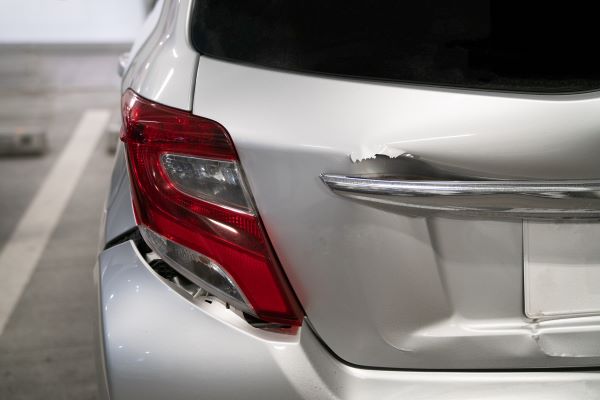There are several reasons why your car may have been declared totaled after a seemingly minor fender-bender. One of the main factors is the extent of the damage sustained by the vehicle. Even a small collision can cause significant damage to the internal components of a car, such as the engine or transmission, which may not be immediately apparent.
Modern cars are equipped with advanced safety features and technology that can be expensive to repair or replace. For example, sensors, cameras, and other components that are part of a car’s advanced driver assistance systems (ADAS) may need to be recalibrated or replaced after a collision.
A Case Study
Take the case of an economy car equipped with an ADAS system. A minor rear-end collision may pull the fender out of alignment, destroying sensors and initiating crumple zones to a small degree, but may still require replacement of the entire section. The owner makes an insurance claim and takes it to a repair shop.
After ordering new parts from the manufacturer and accounting for the installation of the new parts, the cost of repairs may total more than the vehicle is worth. The cost of labor and parts needed to repair a vehicle can quickly add up to more than it’s total value.
In this case, an insurance company will likely total the car. In doing so, they now own the car. Should the owner want to keep the car, they would have to purchase the salvage title of the car from the insurance company and pay for repairs out of pocket. Cost of the title would likely be fair market value, but the vehicle may then be difficult to repair since the total will appear on the vehicle’s history.
Should the owner decide not to buy the car back, the insurance company now has the ability to repair and resell the car on the used car market and turn a tidy profit.
Who ACTUALLY Totaled the Car?
It may surprise readers to learn that often times, the repair shop is not the entity which declared the vehicle totaled. In the above example, the collision repair shop is waiting for a reply from the insurance company and has limited ability to affect the outcome. However, it is often the collision repair shop who is blamed for the loss of a car that’s still drivable.
In some cases, it may be more cost-effective for an insurance company to declare a car totaled rather than pay for extensive repairs. When the insurance company decides this is the best course of action, the body shop must comply with them, even if their assessment is different than the insurance company.
At Newark Autobody, we generally fight to keep the car from being totaled if it’s in the client’s stated best interest, but often it is entirely out of our hands since insurance companies have the final say. As much as possible, however, we seek to return the vehicle to the owner in safe working order.
Some body shops have a reputation for totaling any car they don’t feel is worth their time to fix. From their point of view, it’s better to have the technician’s time and repair bay available for more lucrative repairs. This is especially common at shops where they have more profitable lines of business, such as auto sales.
If this is the situation you are in, remember that you can take your vehicle to another shop and get a second, or even a third opinion. It is illegal for an insurance company to tell you where to take your vehicle for repairs in most states.
Other Factors
Another factor that can contribute to a car being declared totaled after a fender-bender is the age and condition of the vehicle. Older cars may have lower market values, making it easier for the repair costs to exceed the car’s value. In addition, if a car has previous damage or issues, even minor collisions can exacerbate these problems and make it more likely for the car to be totaled.
Lastly, insurance policies also take into account the potential for future issues or diminished value after a collision. Even if a car can be repaired, it may still have underlying issues that could impact its safety or performance in the long run. In these cases, it may be safer and more cost-effective for the insurance company to declare the car totaled.
Final Thoughts
There are a variety of reasons why your car may have been declared totaled after a fender-bender. Factors such as the extent of damage, advanced technology, repair costs, age and condition of the vehicle, and potential for future issues all play a role in this decision. It’s important to work with your insurance company and trusted mechanics to understand why your car was totaled and explore your options moving forward .
Additionally, it’s important to keep in mind that safety is paramount, and if there are concerns about the structural integrity or performance of your vehicle after a collision, it may be best to move forward with a totaled car rather than risk further problems down the road. By understanding the reasons behind why your car was totaled, you can make informed decisions about what to do next and ensure your safety on the road.
Related Reading:
- Should you buy back your totaled car? | CarInsurance.com
- Understand Your Options for a Totaled Car | Investopedia
- “Totaled Car” Guide | Market Watch
Ohio Drivers: Contact Zanesville Autobody for Your Auto Body Repair
This article was originally published by Zanesville Autobody Collision and Glass, LLC, a member of the Autobody of Ohio family of auto body shops.
If you are in Ohio and looking for a quality autobody shop “near me”, we are here to help you. We’ll make your car like new again!
Zanesville Autobody Collision and Glass
1152 Newark Road
Zanesville, Ohio 43701
Phone: (740) 487-3111
Fax: (740) 888-3500

